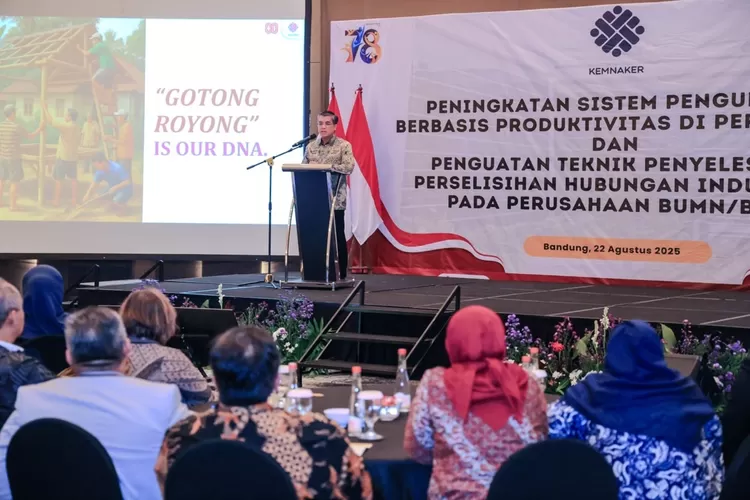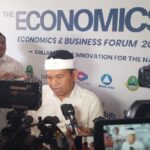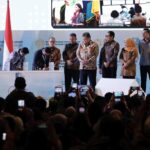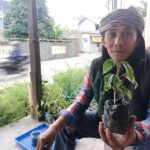The system for resolving industrial relations disputes in Indonesia still faces various obstacles.
These obstacles range from a lack of effective communication at the company level, a limited number of mediators, to the suboptimal role of Bipartite Cooperation Institutions (LKS) and the implementation of Collective Labor Agreements.
Strengthening the mechanism for resolving industrial relations disputes and transforming the employment ecosystem are strategic steps to enhance competitiveness and increase national productivity.
“Currently, the number of industrial relations mediators is only 1,064 people, while they must serve the potential disputes from millions of companies with over 150 million workers. This situation demands an increase in the capacity, integrity, and professionalism of mediators.”
This was stated during the activity for Strengthening Industrial Relations Dispute Resolution Techniques in State-Owned Enterprises/Regionally-Owned Enterprises and Enhancing Productivity-Based Wage Systems in Companies, held in Bandung, West Java.
It was noted that Indonesia’s labor productivity still lags behind other ASEAN countries. Without acceleration, Indonesia risks being overtaken by Vietnam within the next three years.
In response, the Ministry of Manpower is developing a framework for transformative industrial relations maturity that encourages employers and workers to build a shared vision, not just a normatively compliant industrial relationship.
“Transformative industrial relations are born from a shared commitment between the government, employers, and labor unions. This is the DNA of a just and inclusive Indonesian workforce, leading towards Golden Indonesia 2045.”
The activity for Strengthening Industrial Relations Dispute Resolution Techniques in State-Owned Enterprises/Regionally-Owned Enterprises and Enhancing Productivity-Based Wage Systems in Companies aims to improve the capacity of human resources, mediators, and labor unions in designing measurable, transparent wage systems and building harmonious industrial relations.
It was added that the success of industrial relations is not only determined by regulations but also by the commitment of all parties in implementing best practices.
“Tripartite collaboration between the government, employers, and labor unions is a crucial foundation for creating a conducive, productive, and fair working ecosystem.”
Indonesia
Indonesia is a Southeast Asian archipelago comprising over 17,000 islands, with a rich history shaped by powerful Hindu-Buddhist empires, Islamic sultanates, and European colonialism, most notably by the Dutch. Its diverse culture is a vibrant tapestry of these influences, expressed through thousands of ethnic groups, languages, and traditions. The nation is renowned for its stunning natural landscapes, from volcanic mountains and dense rainforests to some of the world’s most beautiful beaches and coral reefs.
ASEAN
ASEAN (Association of Southeast Asian Nations) is a regional intergovernmental organization established on 8 August 1967 in Bangkok, Thailand, by its five founding members. It was created to promote political and economic cooperation, as well as regional stability, among its members. Today, it has grown to include ten member states and is a major economic bloc and a central platform for diplomacy in Southeast Asia.
Vietnam
Vietnam is a Southeast Asian nation with a rich history spanning over 4,000 years, marked by periods of Chinese domination, French colonial rule, and the Vietnam War. Its cultural identity is deeply rooted in ancient traditions, diverse ethnic groups, and a legacy of resilience.
Bandung
Bandung is the capital of West Java, Indonesia, famously known as the “Paris of Java” for its European-style architecture, vibrant art deco buildings, and long history as a fashionable resort city for Dutch colonials. Historically, it was the site of the pivotal 1955 Asia-Africa Conference, which gathered leaders from developing nations to promote economic and cultural cooperation against colonialism. Today, it is a major creative and educational hub, renowned for its university culture, culinary scene, and numerous factory outlets.
West Java
West Java is a province of Indonesia on the island of Java, historically home to the powerful Sunda Kingdom and later the Sultanate of Banten. It is renowned for its vibrant capital city of Bandung, breathtaking volcanic landscapes, and a rich cultural heritage expressed through its distinct Sundanese language, music, and dance.
Golden Indonesia 2045
“Golden Indonesia 2045” is not a physical place or cultural site, but a national vision and strategic development roadmap for the Republic of Indonesia. It was conceived as a long-term goal to transform the nation into a developed, sovereign, advanced, and just country by the time it celebrates its 100th year of independence in 2045. The vision encompasses ambitious targets across economic, social, cultural, and governance sectors to achieve a “Golden Indonesia.”
State-Owned Enterprises
State-Owned Enterprises (SOEs) are commercial entities that are owned and operated by a national or local government. They have a long history, particularly in communist and socialist states, where they were the primary form of economic organization, but they also exist in many market economies to control key national industries like energy, transportation, and defense. Their role and prevalence often reflect a country’s specific political and economic philosophies regarding state intervention in the market.
Regionally-Owned Enterprises
“Regionally-Owned Enterprises” (ROEs) are not a specific cultural site but a category of state-owned enterprises in China that are owned and managed by local or provincial governments, rather than the central government. They emerged as a key part of China’s economic reforms, playing a significant role in regional industrial development and local employment throughout the late 20th century.






